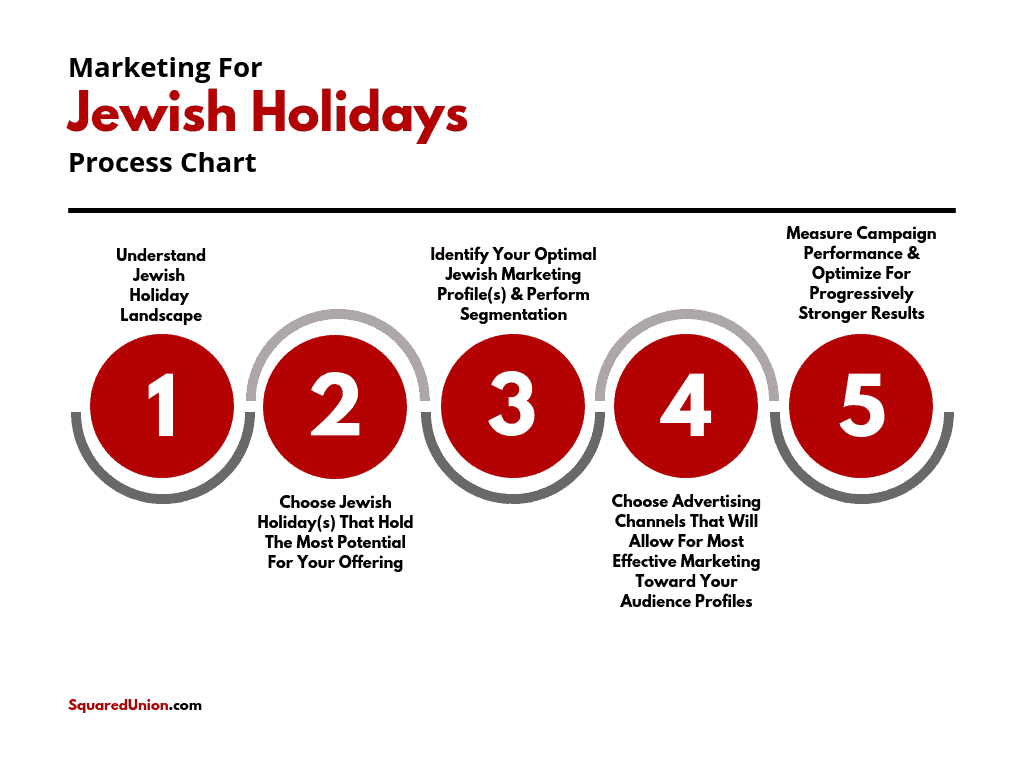
Marketing For The Jewish Holidays
Those who have taken advantage of Jewish marketing opportunities are probably aware that many of the best opportunities revolve around marketing toward the various Jewish holidays. They have come to know that capitalizing on the holidays is especially important for two primary reasons. First, major Jewish holidays are in abundant supply throughout the year, and second, because the Jewish holidays create strong demand for specific products and services.
While the potential reward for making the most of these marketing opportunities should not be understated, there is also significant risk present. The risk, in large part, lies in the fact that each holiday has its own nuances. The varying distinctions native to each Jewish holiday dictate the nature of the corresponding offerings that should be marketed. In essence, capitalizing on marketing opportunities relating to the Jewish holidays requires knowing what the Jewish market wants before, during, and after each of these occasions. This is integral to uncovering the right opportunities for your offering.
In addition, the substantial differences between each Jewish holiday also impact the messaging and overall marketing strategy that should be employed to achieve optimal campaign performance.
The key to success, therefore, is having an intimate understanding of the Jewish holidays as well as the varying Jewish audiences and how to effectively reach them. This can be quite a high bar to achieve which speaks to why properly formulating a Jewish holiday marketing campaign can indeed be a challenge.
Even with these significant hurdles, there is much in terms of potential for those campaigns that are executed correctly. With such potential, it should be of little surprise that some of the biggest brands are specifically marketing toward demand created by the Jewish holidays.
For example, one of the most significant Jewish holidays (in terms of length and rate of observance) is Passover. It is also one of the holidays that we see mainstream brands most actively marketing toward. For example, Coca-Cola markets a “Kosher for Passover” version of some of its soft drinks. Pepsi also markets several Passover-specific beverage formulations, including the popular Tropicana brand orange juice. In the world of snacks, Lays potato chips are also in on the action, and the list goes on.
Beyond these larger brands, though, there are countless smaller companies finding success by profiting off of opportunities that the Jewish holidays present.
So how should one go about marketing for the Jewish holidays?
As mentioned previously, the first step should be gaining an understanding of the main Jewish holidays and how they might present a unique opportunity for your offering.
Knowledge Of The Jewish Holidays
While there is an abundance of Jewish holidays throughout the year, there are certain holidays that can be termed “major holidays” and those that are less so. For example, as mentioned, Passover is considered one of the most celebrated and significant Jewish holidays. The reasons for this classification are numerous, but it is in large part because of Passover’s length, historical significance, and substantial preparation requirements. Generally, the more significant a Jewish holiday is, the more potential is present to capitalize on marketing opportunities. It is important to stress, though, that significance is not always a reliable marker for the level of marketing potential present. A case in point is the High Holidays. Although widely celebrated, the marketing opportunity is, on average, less significant than some of the other holidays. With that said, for the right offering, the High Holidays might present a stronger marketing opportunity than perhaps even Passover.
Identifying Your Optimal Jewish Audience
Once a foundational understanding of the Jewish holidays and how they relate to your offering has been accomplished, progression further into ascertaining the optimal Jewish audiences for your campaign is necessary.
As we have discussed at length in past discussions, understanding your optimal Jewish demographic is of great importance. This is due to the fact that within the broader Jewish audience, there are numerous subset audiences. Segmentation of the greater Jewish audience along various data points such as location, religious affiliation, as well as more granular psychographics will often make a big difference in terms of return on ad spend. Here too, being aware of nuance is of extreme importance. While some Jewish segments may be great targets for your Jewish holiday campaign, others may not be as good or perhaps may not be relevant at all.
For example, a client marketing their kosher baking products, especially certified for Passover, would do well to primarily market to Jewish women in a specified age bracket. Further, take, for example, a family-friendly hospitality-focused offering trying to market toward the demand generated by Passover vacation. The stakeholders of such an offering would do well to formulate messaging and targeting toward profiles made up of decision-makers for such trips.
The way to properly formulate optimal Jewish segmented marketing profiles is varied but, for the most part, relies on a strong understanding of both the Jewish audience landscape and the proposed offering. Through research, data-backed insights, and optimization, progressively stronger marketing profiles can be formulated and revised on an ongoing basis.
While this may sound somewhat complex, the good news is that with the increasing capabilities afforded by data-backed advertising, forming and subsequently reaching these optimal segment profiles is more attainable than ever before.
Choosing The Right Channel
Once a holiday-specific opportunity has been identified and optimal target audiences have been ascertained, it is then important to formulate a plan as to the best way to reach your desired Jewish audience. Specifically, the question should be structured as to what is marketing channel or platform that will provide the best return toward trying to reach the identified marketing profiles. For example, will the marketing mix use a conglomeration of digital channels such as Google Search/Display and Facebook, or is there perhaps more opportunity present via platforms native to reaching the Jewish audience?
When it comes to decisions regarding channel and platform, we believe in forming lean, data-backed marketing mixes that can be continuously optimized in terms of both targetings as well as channel/platform utilization. This allows for results to be continuously measured and optimized, which results in better performance.
Properly choosing marketing channels requires knowledge of the target audience, including their buying habits, as well as an in-depth understanding of how to most effectively reach them. In addition, being aware of platform capabilities, historical benchmarks, and measurement integrity is of immense importance. This is accomplished by gaining experience with the different marketing channels and platforms available on the market and knowing which ones will work best for different offering scenarios within a Jewish marketing context. Paying attention to new marketing developments and what is working with today’s consumers, such as the current influencer marketing wave, can also pay great dividends for your efforts.

In sum, in order for a strong Jewish holiday marketing campaign to be properly formulated and successfully implemented, knowledge of all core aspects of the campaign is required.
Summary Of Steps For Success
- An understanding of the array of Jewish holidays is of great importance. Knowing if there are opportunities for your product or service in relation to a specific Jewish holiday should be the central point of analysis.
- Once a Jewish holiday has been chosen, it is then necessary to decide on the proper and optimal Jewish audience. This is especially vital since there are many different subsets of Jewish audiences within the broader Jewish community.
- Finally, once optimal audience profiles have been selected, it is time to decide on the appropriate channels to be used to reach said Jewish audiences. Understanding which platform within a specified marketing channel will be most effective is a core tenet of a strong campaign. In addition, being strategic about design, messaging, and tone of marketing efforts should be made a priority.
A discussion on the major Jewish holidays and other related insights can be viewed here.
